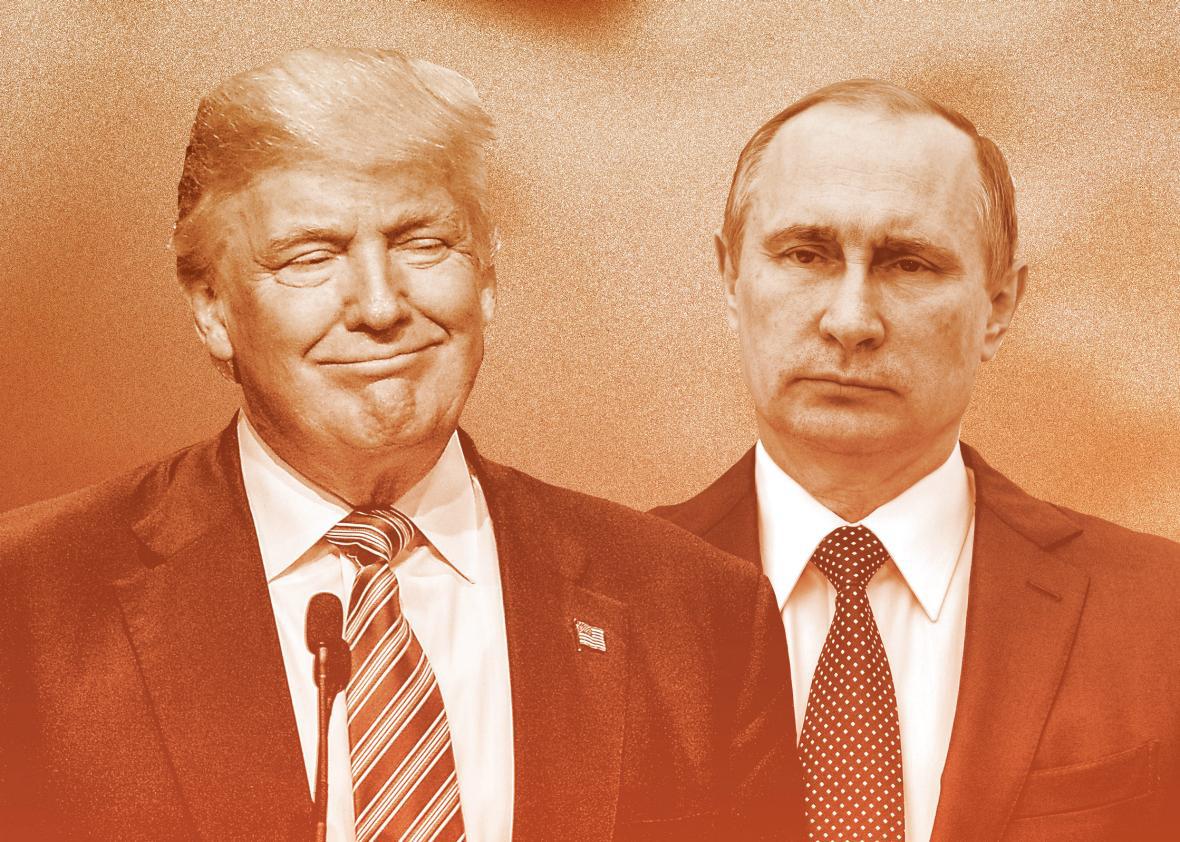Donald Trump and Vladimir Putin are both lying. Only one of them, however, is cunning; the other is gaffing his way toward treason. Trump has emphatically denied ties to Russia—a claim refuted by his Twitter feed and a cursory Google search. Putin says his government had nothing to do with the hack of the DNC computers, even though it carelessly left a trail of crumbs tracing back to his intelligence services. The cunning liar is exploiting the blundering one.
Let’s be clear: Trump isn’t a Manchurian candidate. He’s not taking orders from the Kremlin. As I wrote on Friday, Trump is a useful device for Putin—a way to hurt the United States and perhaps a way to exact revenge on Hillary Clinton. Putin has made a habit of supporting far-right candidates who undermine his foes in Europe; perhaps he never could have imagined such a character taking root on American soil. Trump’s reasons for aligning with Putin have been more innocent, if no less dangerous. Trump is a real estate guy who sucks up to power to get buildings built. And he desperately wanted to build in Russia—the dream of Trump Tower Moscow has been a constantly recurring one. “We will be in Moscow at some point,” he once proclaimed.
When he took his many trips to Moscow, Trump praised authorities so that he could get the necessary approvals. His kind words to Russian leaders and his personal style endeared him to the country’s new elite. Trump is baldly denying these efforts—“I have nothing to do with Russia,” he said on Wednesday. It’s true that his Moscow building never broke ground, but Russian investment flowed to his properties. “Russians make up a pretty disproportionate cross-section of a lot of our assets,” Trump’s son, Donald Jr., once bragged. “We see a lot of money pouring in from Russia.” Or as Trump himself once put: “The Russian market is attracted to me.”
This investment wasn’t incidental to Trump: It was essential. After his 2004 bankruptcy, the big banks wouldn’t touch him. Who would? He had a record of litigiousness and going belly up. But Russian investors helped prop up Trump’s megabuilding projects, which were crucial to his image as a man who makes things, not just a reality television star. There would be no Trump SoHo, for instance, without capital from Russia. As one lawsuit alleges, the money arrived at Trump projects through an Icelandic investment fund “in favor” with Putin’s elite and through mysterious infusions of cash from Russia and Kazakhstan into the accounts of his partners.
It’s not hard to see why this dependence, and his fawning words about Putin, would endear him to the Kremlin. Putin would be foolish not to lend Trump a quiet hand. And, indeed, his inner circle has made little secret of its rooting interest in the Trump campaign. Russia Today, Putin’s primary propaganda vehicle, routinely trashes Hillary Clinton and praises Trump’s courageous stances.
Perhaps our intelligence community has a better sense of the ultimate goal of Russia’s hack. But it doesn’t take much imagination to describe the relationship between the Kremlin and Trump campaign as symbiotic. Let’s review the events of the past few weeks. First, Trump softened the Republican Party’s stance on Ukraine; then Trump announced that he wouldn’t come rushing to the aid of NATO allies invaded by Russia. That was followed by the leak of the Democratic National Committee emails, on the eve of the convention—an event that Julian Assange implied was intended to injure Hillary Clinton. It’s hard to imagine that this chain of events was coordinated. Yet Trump and Putin profited from one another in measurable ways.
At Wednesday’s press conference, Trump made clear that he wasn’t standing in Putin’s way. He wouldn’t ask Putin to desist from hacking his enemy; instead, he mused aloud about how he hoped Russia would obtain Hillary Clinton’s email. “Russia, if you’re listening, I hope you’re able to find the 30,000 emails that are missing,” he announced. The only way to procure those emails would be to steal them. What’s more, those aren’t campaign documents from low-level staffers or hacks at a political party: He’s advocating the Russians steal documents produced by the secretary of state—and he wants to broadcast them to the world. (Later he suggested it would perhaps be more appropriate for Russia to share them with the FBI.) It was grossly negligent for Hillary Clinton to leave her emails so exposed, and she should be shamed and hounded for her indifference to cybersecurity. But that’s a sin of omission. By any moral calculus, Trump just committed a far worse offense. He advocated that a foreign country commit espionage in order to weaken his political opponent.
Pause to consider: The Republican presidential nominee wants another country to steal secrets from the United States and not in the interests of exposing military misadventures or for some high-minded reason. He wants to expose American secrets in order to hurt his foe. Nixonian doesn’t even begin to capture it.
